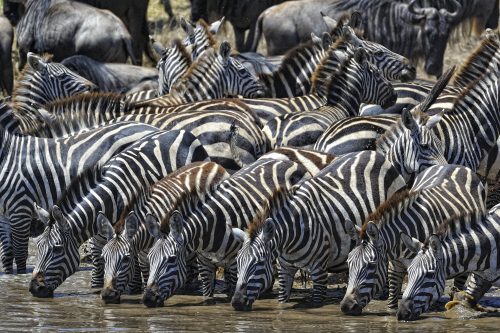
Diana Robinson, Zebras drinking at the watering hole – From flickr under creative commons license: Attribution, NonCommercial, NoDerivatives.
Sustenance has many faces and can be looked at from a myriad of angles. What sustains our hearts, our minds, our bodies, our spirits, our families, our communities, our environment? What sustained our ancestors and our elders? What will sustain our children and grandchildren and those who come after them? With millions of people displaced around the world, many of them minors, many of them unaccompanied, what changes will address their basic needs for sustenance?
In this issue, Rana Bose takes a crack at the thorny issue of why sustenance – the basic conditions that need to be fulfilled if we are to survive and thrive collectively – gets sidelined and in particular, why the root causes of problems get lost in the shuffle.
Abby Lippman adopts a more micro focus, reflecting on individual women who have been unseen and “unseened” – elder women in our families who spoke little, relatives who have disappeared – whose sources of personal sustenance may never be known to us. For Abby, resistance itself may be a source of sustenance, and “for our own sustenance, we need to honour these silenced and silent women and all others who are still exiles and violated and unseened.”
In an interview conducted by Claudia Itzkowich, the curator and two of the artists participating in a Montréal exhibit called Hōshanō – the Japanese word for radioactivity – grapple with how to generate and sustain consciousness of an invisible on-going enemy – one that must be acknowledged in order to be addressed in a post-Fukushima world. Truth-telling through art may prove to be a means of collective sustenance.
In “The Biodiversity Crisis,” Patrick Barnard elaborates on the loss of biodiversity worldwide as a question of life and death, both on a planetary scale and at the local level, in his hometown of Montréal. The warning voices of experts in biodiversity “are telling people the unvarnished truth. At the present time, however, the ruling political classes in the world, without exception, are not prepared to do the heavy lifting to really ensure human survival in some decent form.” Patrick puts out an impassioned call for key strategic action and a major shift in our own awareness of our habitat.
Michael Bristol’s essay, “The Man who Taught his Horse to Live without Eating,” delves deep into the issue of sustenance to discuss distribution of wealth, the idea of distributive justice and our duties towards the sustenance of our fellow human beings.
Two poems are featured in this issue that leave us pondering the darker recesses of sustenance: “Portrait” by Nada El-Omari, a compelling inner wrestling with destructive love, and Catherine Watson’s “Can I be old,” an uneasy questioning of the truths about growing old.
Nilanjan Dutta’s “Dreams and Other Lifelines” is inspired by Che Guevara’s quote on “our freedom and its daily sustenance,” and reflects on freedom, sacrifice and resistance as sources of sustenance in times of social turmoil and unrest.
Montréal Serai co-editor, Nilambri Ghai, interviews Jeevan Bhagwat, a Toronto-based poet and co-founder of the Scarborough Poetry Club. This club provides poets with the necessary resources to sustain their art as well as a venue to be heard, and addresses social issues through poetry, such as homelessness, racism and inequality.
Veena Gokhale reviews two books by Normal Nawrocki, a Montréal-based cabaret artist, author, actor, musician, educator… and intrepid social activist who, in her words, “will get you out of your armchair, searching for the next protest march.” Anne Cimon reviews Shimmer Report, a collection of poetry by Brian Campbell that is immersed in the shimmering sustenance of seasoned love, music, and a deep appreciation for Montréal and its natural landscape. Su J. Sokol’s dystopian novel, Cycling to Asylum, also has Montréal as part of its backdrop, here as a place of refuge. Reviewed by Cora Siré, “Sokol delivers an Orwellian prescience” in this novel. Maya Khankhoje savours The Invention of Wings, a novel about slavery and the power of women’s friendship and solidarity. In a lyrical review of Après Satie: For Two and Four Hands by Dean Steadman, Lesley Strutt begins with the hope of something “rich and flavourful” and is not disappointed with this collection of prose poems inspired by Erik Satie, early 20th-century Parisian avant-garde pianist and composer. For Strutt, “Après Satie is filled with delicious mouthfuls of vowels and consonants, fairy tale phrasing, and spicy turns which fully satisfy.”
Montréal Serai has always done its utmost to support and sustain marginal voices that might not easily persevere, and we were pleased to participate in the Conseil des arts de Montréal’s roundtable discussion on “Montreal – Cultural Vitality and Inclusive Artistic Communities.” Maya Khankhoje gives us a special report.
We hope this issue will fuel and sustain you through the bumpy transition from winter to spring. Keep an eye out for more offerings in the weeks to come, including Montréal street art as sustenance and poetry by Jaspreet Singh. Enjoy!










